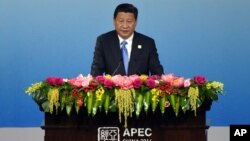Chinese President Xi Jinping says that while China's economy faces challenges, they are not as scary as some may think. In an address to world business leaders Sunday, Xi also called for more progress on a regional free trade agreement and highlighted China’s plans to set up a $40 billion fund for infrastructure development in the region.
President Xi Jinping says that as China adapts to what he calls a “new normal” of slower growth and slacking exports, the country’s growth rate is still ranked as one of highest in the world at about seven percent.
China economy
Xi says “some people worry that China’s economy will fall further, or whether it can climb over the next ridge?” He says “there are indeed risks, but they are not that scary."
China’s economy slipped to a new low in the third quarter. It is now at the lowest point since the 2008 and 2009 global financial crisis.
Xi’s remarks came at the opening ceremony of the Asia-Pacific Economic Cooperation’s CEO Leaders Summit. In the address, he noted that as China works to promote an aggressive reform agenda domestically, it is already seeing some improvement - such as stronger domestic consumption.
He also says there is no turning back for Beijing on a massive reform agenda that was launched late last year.
China’s president says, "once the bow is drawn, the arrow cannot be put back in the quiver.” He says China is committed to deepening reforms and giving the market more influence in the economy.
Reforms, building infrastructure
At the same time China is looking to reform itself, it is also reaching out to deepen economic engagement with the region. Xi says China will put $40 billion into the establishment of a Silk Road Fund to help with the building up of infrastructure across the region.
China is aggressively seeking to strengthen ties with Central Asia through a New Silk Road policy and what it calls a Maritime Silk Road Route through Southeast Asia and on to South Asia and the Middle East. To help spearhead that effort it established the Asian Infrastructure Investment Bank last month.
China’s president says that over the next decade his country’s outbound investment will total more $1 trillion. He also notes that six out of the top 10 destinations for Chinese investment are in Asia.
Short-term plan
Xi says that over the next five years, “China will import over $10 trillion worth of goods and the number of outbound Chinese tourists will also exceed 500 million.” He says that “for the Asia Pacific and the world at large, China’s development will generate huge opportunities and benefits."
China’s big pledges of money, tourists and engagement are to be expected as a host of APEC and as the country works to ease concerns in the region following months of tensions with Japan and neighbors in the South China Sea over territorial disputes.
It also comes as Beijing is increasingly competing for influence with the United States. China is hoping APEC can push ahead with a regional free trade agreement that aims to bring together what some refer to as a spaghetti bowl of free trade agreements that already exists across the region.
At the same time, however, that effort is increasingly seen as competing with Washington’s Trans-Pacific Partnership, a regional trade agreement that includes 12 countries, all of which are members of APEC.
China has expressed interest in joining the TPP talks, but it currently is not involved.




